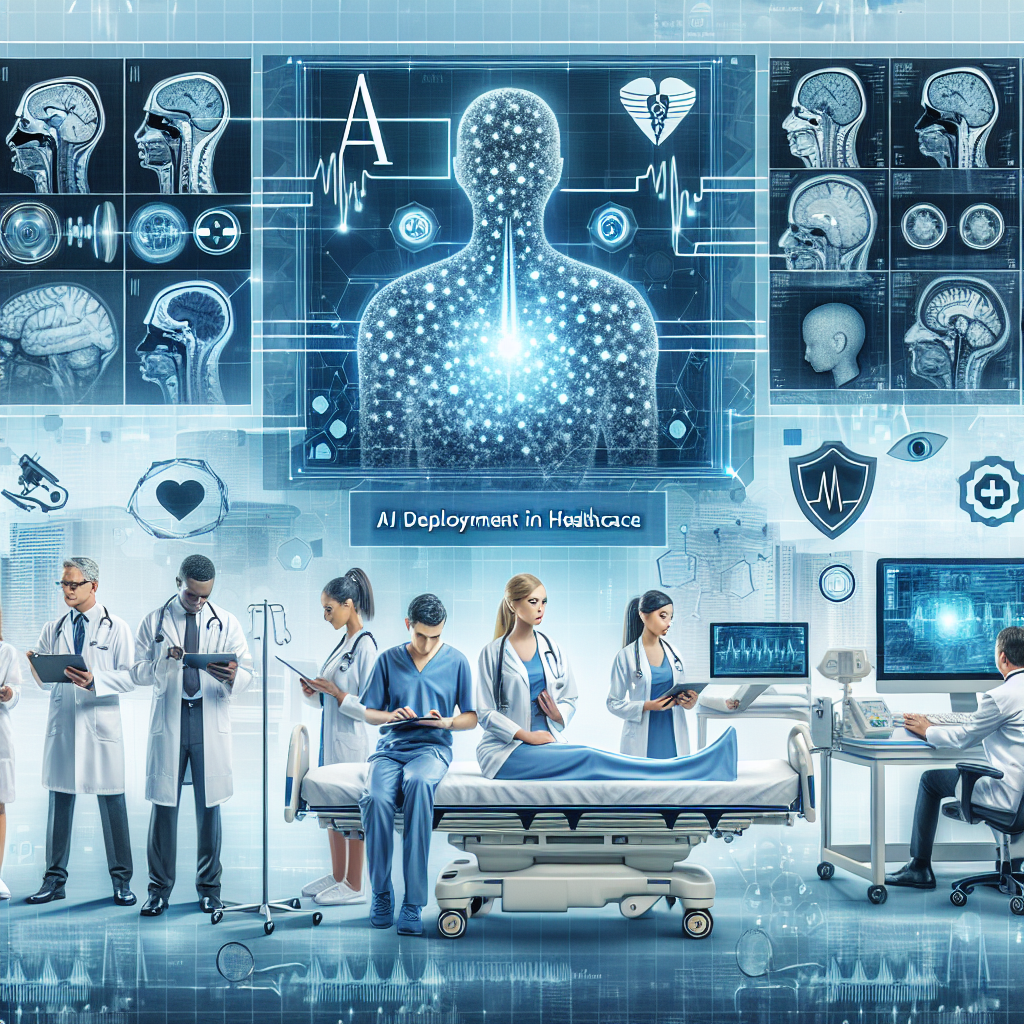Artificial Intelligence (AI) has been making significant strides in revolutionizing various industries, and one of the sectors that has seen a major impact is healthcare. The deployment of AI in healthcare has the potential to enhance diagnosis and treatment, leading to more accurate and efficient patient care. In this article, we will explore the various ways in which AI is being used in healthcare, the benefits it brings, and some common FAQs surrounding the deployment of AI in healthcare.
AI in Healthcare: Enhancing Diagnosis and Treatment
AI has the capability to analyze vast amounts of data and identify patterns that may not be readily apparent to human healthcare professionals. This ability can be particularly useful in the field of medical imaging, where AI algorithms can help radiologists detect and diagnose diseases such as cancer, heart disease, and neurological disorders faster and more accurately.
For example, AI-powered algorithms can analyze medical images, such as X-rays, MRIs, and CT scans, to detect abnormalities and provide insights to healthcare providers. These algorithms can also help in predicting the likelihood of certain diseases based on a patient’s medical history and other relevant data.
In addition to medical imaging, AI is also being used to assist in the diagnosis of various conditions by analyzing patient data, such as electronic health records, lab results, and genetic information. By leveraging this data, AI algorithms can help healthcare providers make more informed decisions about diagnosis and treatment options.
Furthermore, AI can also play a crucial role in personalized medicine, where treatments are tailored to an individual’s unique genetic makeup and medical history. By analyzing genetic data and other relevant information, AI algorithms can help identify the most effective treatment options for each patient, potentially leading to better outcomes and reduced side effects.
Benefits of AI Deployment in Healthcare
The deployment of AI in healthcare offers several benefits that can improve patient care, increase efficiency, and reduce costs. Some of the key benefits of AI in healthcare include:
1. Improved Diagnosis: AI algorithms can help healthcare providers make more accurate and timely diagnoses by analyzing medical images and patient data. This can lead to earlier detection of diseases and better outcomes for patients.
2. Enhanced Treatment Planning: AI can assist healthcare providers in developing personalized treatment plans for patients by analyzing their medical history, genetic data, and other relevant information. This can help ensure that patients receive the most effective and appropriate treatment options.
3. Increased Efficiency: AI can automate routine tasks, such as data entry and administrative work, freeing up healthcare professionals to focus on patient care. This can help reduce wait times, improve workflow efficiency, and enhance overall productivity in healthcare settings.
4. Cost Savings: By streamlining processes and improving outcomes, AI deployment in healthcare can help reduce healthcare costs and improve resource allocation. This can lead to more efficient use of healthcare resources and better outcomes for patients.
5. Research and Development: AI can also play a crucial role in accelerating medical research and drug development by analyzing large datasets and identifying patterns that may not be readily apparent to human researchers. This can help drive innovation in healthcare and lead to the development of new treatments and therapies.
FAQs about AI Deployment in Healthcare
Q: Is AI in healthcare replacing human healthcare professionals?
A: While AI can assist healthcare professionals in various tasks, such as diagnosis and treatment planning, it is not meant to replace human healthcare professionals. AI is meant to augment human capabilities and support healthcare providers in delivering better patient care.
Q: How is patient data protected when using AI in healthcare?
A: Patient data security and privacy are paramount when deploying AI in healthcare. Healthcare organizations must comply with strict regulations, such as HIPAA, to ensure the protection of patient data. AI algorithms must also be designed with robust security measures to safeguard patient information.
Q: What are the challenges of deploying AI in healthcare?
A: Some of the challenges of deploying AI in healthcare include data interoperability, regulatory compliance, integration with existing systems, and ethical considerations. Healthcare organizations must address these challenges to ensure the successful deployment of AI in healthcare settings.
Q: How can healthcare providers ensure the accuracy and reliability of AI algorithms?
A: Healthcare providers must validate AI algorithms using large and diverse datasets to ensure their accuracy and reliability. Continuous monitoring and feedback loops are also essential to ensure that AI algorithms perform effectively in real-world healthcare settings.
Q: What is the future of AI deployment in healthcare?
A: The future of AI deployment in healthcare is promising, with continued advancements in AI technology and increasing adoption by healthcare organizations. AI has the potential to transform healthcare delivery, improve patient outcomes, and drive innovation in the field of medicine.
In conclusion, the deployment of AI in healthcare is transforming the way healthcare is delivered, enhancing diagnosis and treatment, improving patient outcomes, and driving innovation in the field of medicine. By leveraging the power of AI algorithms to analyze vast amounts of data and identify patterns, healthcare providers can make more informed decisions and deliver personalized care to patients. As AI technology continues to evolve, the future of healthcare looks brighter than ever, with AI playing a crucial role in shaping the future of medicine.

